Farmers Question Time shines spotlight on Scots politics
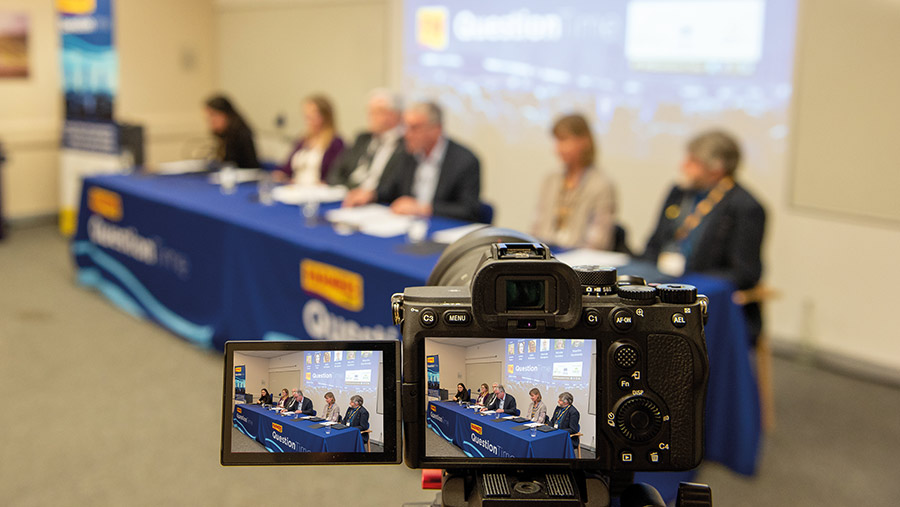 © Angus Findlay
© Angus Findlay Experts on Scottish agriculture were grilled last week at Farmers Weekly’s second Question Time event, held at the SRUC Oatridge campus.
During a lively discussion, audience members asked the panel questions on a range of topics including, food production, Nicola Sturgeon’s resignation, tree planting and how to attract young people to farming.
Read some of the questions and answers, listen to the podcast and watch the video, all below.
You can reserve a space at the next event on 20 April at the John Innes Centre in Norwich on the Question Time website.
See also: Farmers shape the debate at Farmers Weekly Question Time
The panel
- NFU Scotland president Martin Kennedy
- Food safety professor Nicola Holden
- Scottish government farming and rural policy director George Burgess
- Dairy farmer Sally Williams
- Award-winning environmental author Louise Gray
Question Time Scotland podcast
Question Time Scotland video
Farmers’ questions
Are Scottish farmers morally obliged to maximise food production?
NFU Scotland president Martin Kennedy said the answer was “absolutely, to a huge degree”.
He pointed out that Scotland’s rainfall is a massive asset that is sought-after globally.
“From a global perspective, we can produce food well and we can produce it sustainably.
From a livestock point of view, we should be producing more livestock,” he said. “If we do not do it here, we will import it from other parts of the world.”
George Burgess, Scottish government interim director of agricultural and rural economy, “agreed very largely” with Mr Kennedy.
“Food production is at the heart of our vision for agriculture in Scotland and for the support package we are seeking to put in place,” he said.
However, Scottish borders dairy farmer Sally Williams warned of the need to be careful in the food security conversation.
“We hear all the time that people should eat local and support British or Scottish,” she said.
“But at the same time, we as farmers are seeking the best market for our product, and if that involves export, then how can we refuse to import if we are expecting others to buy what we export?”
Audience comment from Allan Bowie, Kilmarnock: “I grow barley for whisky production. Am I going to start thinking that might create problems elsewhere? As a farmer, I am really struggling morally and ethically.”
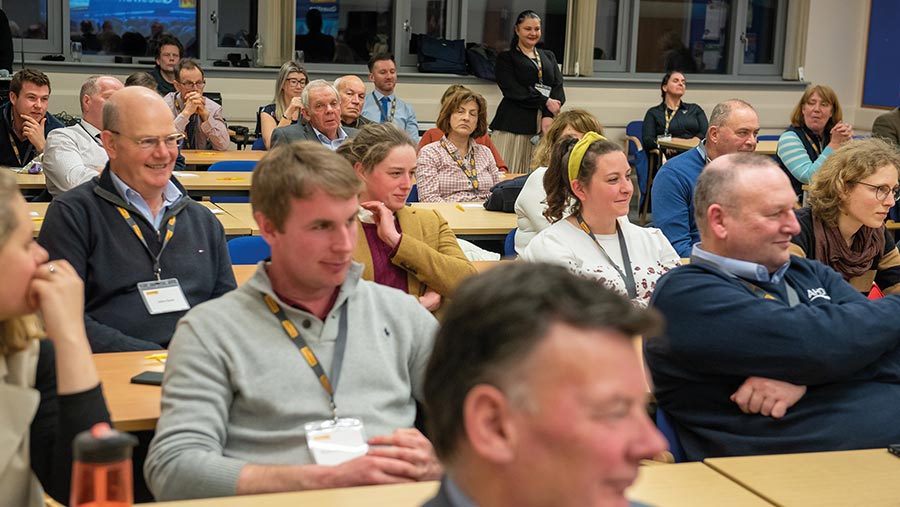
© Angus Findlay
Does the quest for net zero put food safety and security at risk?
Mr Burgess emphatically denied that food security was being put at risk by the push to reach net zero, claiming not taking action was a greater risk.
“Lots of the areas we depend on for maize and soya look as if they will have significant reductions in their ability to produce [as a result of climate change],” he said.
“If we do not play our part in tackling net zero, we are going to have even bigger problems.”
He also rebutted suggestions that the Scottish government was keen to reduce the beef herd to meet climate targets, claiming “we are backing beef”.
Ms Williams, however, said there must be a limit to what farmers are expected to achieve on climate mitigation.
“I have a major problem with the idea that royalty can fly about and plant 50 trees and that is OK, and yet I have to reduce my carbon footprint in order for people to have healthy, nutritious food on their plate every single day of their life,” she said.
“We have to start being less apologetic, deal with it head on without saying it is all our fault. Society is going to have to take responsibility for what society is doing.”
Nicola Holden, professor of food safety at Scotland’s Rural College (SRUC), said it would be important to consider the food safety implications of taking action such as feeding additives to cattle to reduce methane emissions.
“We need to understand what is going to happen with the animals as a whole and not just how it will affect one aspect,” she added.
Audience comment from David Hopkins, SRUC: “Are we making it too difficult for agriculture because so much of the emphasis is being placed on farming’s responsibility for net zero, when we all participate in transport and energy and the other sectors? It is too big a question for farming alone to deal with.”
What effect will Nicola Sturgeon’s resignation have on future agricultural policy?
Mr Burgess suggested agriculture had benefitted from “remarkable stability” in Scottish politics in recent years.
“If you think back, we have had four farming ministers since 1999,” he said. “All of those characters have been enthusiastic supporters of the sector. That is a remarkable level of support and stability agriculture has enjoyed.
“We were super busy before Nicola Sturgeon decided to resign and we are still super busy. The business of government has not stopped. There are bound to be changes, but we have dealt with that in the past.”
Ms Williams said the first minister’s resignation should, in theory, have no effect.
“I think it will make no difference, simply because they are still trying to figure out what on earth they are going to do,” she added.
“It is not going to matter who is sitting in that seat.”
Mr Kennedy, meanwhile, emphasised the need for farm policy to be industry-led, no matter who is in government.
“Would a reshuffle change the dynamics within Scottish government’s ministers?”, he asked. “We do not know that yet. I would like to think it would be left to industry to keep leading this.”
How do we encourage more people into farming?
Ms Holden said the main way to get more people into agriculture would be to highlight the diversity of different jobs in the sector.
But she also called on farmers to use people’s “obsession with food” to their advantage.
“You see it on all the socials – what do people do when they go into restaurants? They take a picture of their food,” she said.
“Why are we not using that angle?”
Environmental journalist and author Louise Gray called for “cultural barriers” preventing women from entering agriculture to be knocked down, while Mr Burgess referenced a recent Scottish government rural skills review which made recommendations to connect people to jobs.
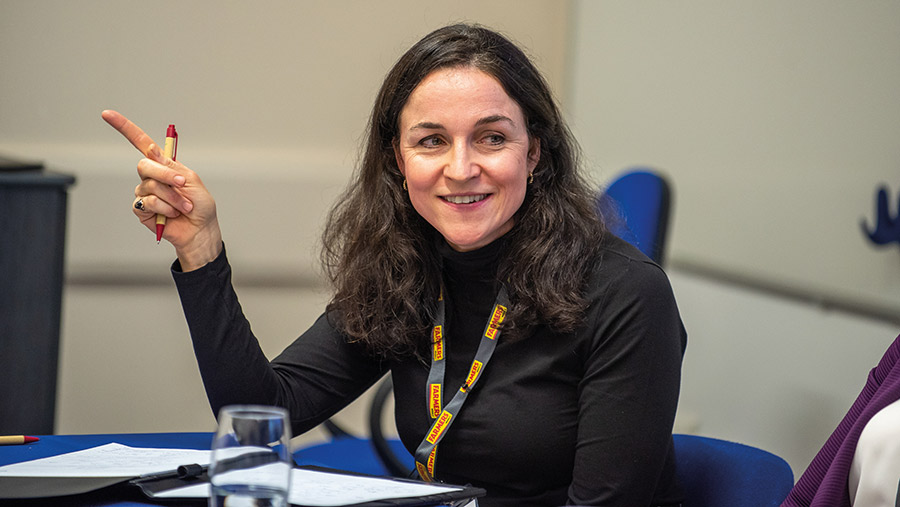
Louise Gray © Angus Findlay
For Ms Williams, ensuring people are filling jobs at all levels of farming is the key point.
“Everybody gets carried away with the science and technology and the management-level stuff,” she said.
“But the shortage of labour on farm is the whole length of it,” she said.
“I milk cows with robots, which is advanced. I still need somebody to walk around and scrape s**t off beds. You do not need a degree to do that, you do not need a diploma. You just need empathy with the animals to make sure you are not scaring them as you go round.
“We need to be proud of a job well done and the job satisfaction that gives you, instead of encouraging everybody to chase the heady heights of management and the high level of further education.”
At a time when nurses, teachers and others are struggling with the cost-of-living crisis, can the Scottish government justify spending millions on tree planting at Glenprosen Estate?
Mr Burgess defended the Scottish government’s acquisition of the Glenprosen Estate for £17.6m, saying a “significant increase” in the planting of trees was needed across Scotland.
But he also said there was need to look holistically at agriculture and forestry, integrating the two.
“There are already protections in place for the better classes of agricultural land,” he added.
Ms Gray also suggested the idea was to encourage private sector investment over the longer term.
“In the Highlands and Islands a lot of money is going to come from private funding because of emerging carbon markets,” she said.
“The government might be investing now, but in the future it is going to be a market. People will want to plant trees to gain carbon credits, so it should take off into something that does not require public money.”
But Mr Kennedy said the carbon market was “like the wild west”. “Nobody has any control of it,” he added. “The values you see from £2 up to £80 are incredible.
“We have a fantastic opportunity to export or to use at home products we can produce in a carbon-positive manner, and yet we are selling it to industries that are not changing their practices.
“They are using it to offset their own failings.”
Audience comment from Tom French, Biggar: “I think it is obscene that the government is spending £17m of taxpayer cash when there are other more demanding needs for it.
Considering that the NHS is on its knees, how can the government find £17m to buy a Highland estate, when the merits are questionable?”
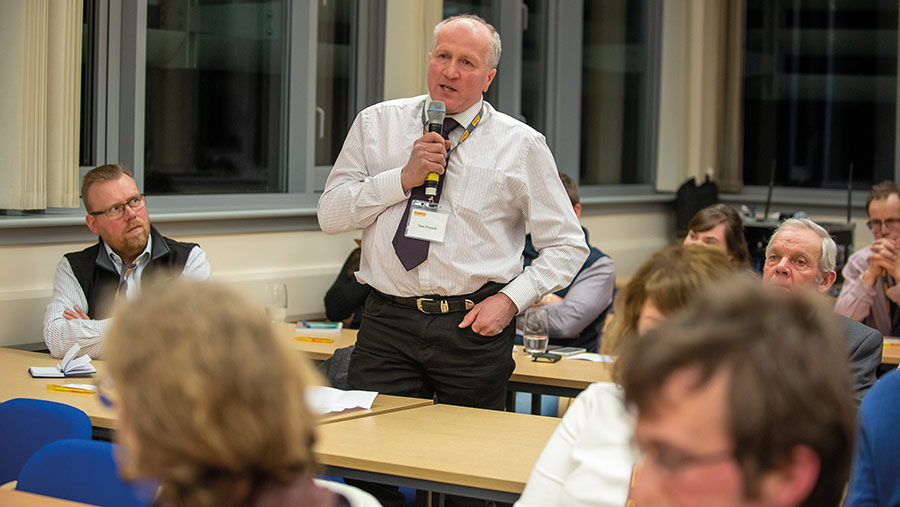
Tom French © Angus Findlay
How do we ensure the right people are on the right land, using it in the right way?
Mr Kennedy said he did not believe the current system was broken. “I do not think we are that far off the mark from the right people doing the right things,” he added.
“But we probably need to integrate it better, looking at it from a forestry perspective and an agricultural perspective. Communication needs to be better.”
Mr Burgess agreed, saying the answer was not for government to get involved.
“It did not work for Stalin and it certainly would not work for us,” he said. “If the system is not broken, can we make it work with the incentives we have?
“We do put a lot of money into the sector, but are we incentivising the right things or creating perverse incentives?
“Answers on a postcard please, because that will help us to make sure we are getting the right things in the right place.”
For Ms Williams, the real question was who decides who the right people are, what the right use is and what the right land would be.
“At the moment, it is driven by market forces,” she said.
“As much as George wishes governments are not legislating and affecting that, every single regulation they pass does affect the market we are operating in.
“The market will decide where the people go and how the land is used.”
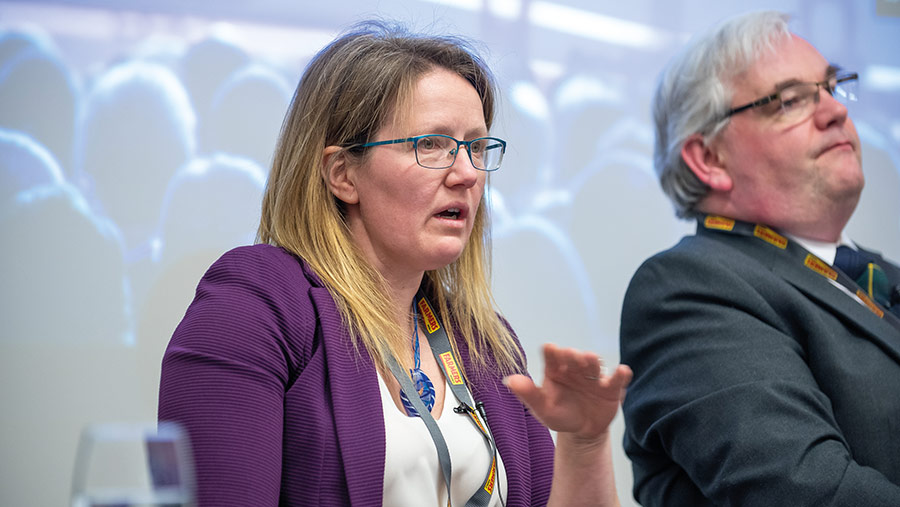
Sally Williams © Angus Findlay
Which one farming law or regulation would you change if you could?
Mr Kennedy said he would change planning law if he was able to.“We can do so much with planning,” he said.
“It would help with affordable housing for people struggling to get on the ladder, or with development of businesses that are proactive in agriculture.
“Whether that is to do with solar panels or putting a wind turbine in, we need to sort some of the planning regulation that is holding this country back.”
However, Ms Williams hit back at this suggestion. She said the problem was not the regulations, but the people enforcing them.
“I have sat on a number of committees in my life, including at European level, and I can tell you I have huge sympathy with every law and regulation that comes in,” she said.
“No matter how stupid they seem, it generally has stemmed from people wanting to do things better.”
Ms Gray disagreed, saying she would like to introduce a right to food, which the United Nations has branded a human right.
“In terms of smaller rules, maybe feeding pigs and chickens food waste again,” she added.
“It happens in other countries, in Taiwan and the Far East. That seems like a good way to reduce food waste.”
